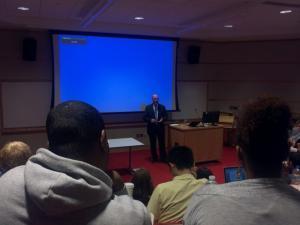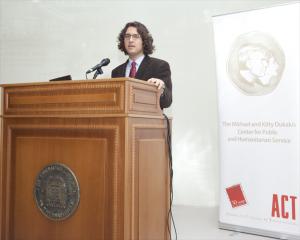It might well have been the inverse: «The Crisis in Greece and the Future of the EU». Semantics aside, the core problem I will address is whether the ever imminent bankruptcy, and potential collapse, of the Greek state is a European problem. What better place to discuss this than at the Levitt Center in the company of that preeminent Europeanist, my friend and host Alan Cafruny.
Let me say a few words by way of personal introduction. I moved permanently to Greece in August 1994, to the home town of my wife, Thessaloniki, having been a regular visitor since 1988. I teach at the American College of Thessaloniki, where I am also the Director of the Dukakis Center. My mission in this capacity is to try to inspire college students from Greece, Southeast Europe, and the US to engage in one form or another of public service.
Introductions aside, this is a talk about Greece and the crisis in the European Monetary Union, the EMU or eurozone. A bit of context will serve us well at this point, and here are the main facts.
Greece has been a member of the EU (formerly the EC) since 1981. The country adopted the common currency in 2001.
The EU is an intergovernmental organization with the trappings of federal governance. There has been considerable debate on the nature and future of European integration, which consists, among other things, of a broadening and deepening of the reach of EU institutions, and the geographical enlargement of the EU itself.
A key feature of accession to full EU membership is the meeting of strict criteria. This is true also for membership in the EMU.
Sadly for both the Hellenic Republic and the EU, Greece was no more ready to join the eurozone in 2001 than it was ready to join the European Community in 1981. It was subsequently revealed that Greece had fudged her numbers prior to adopting the euro, and quite likely that leading EU officials knew this.
Fast forward to 2009. The conservative government of Kostas Karamanlis (whose family has a connection with Hamilton College), is defeated in a snap election by the socialist PASOK party led by George Papandreou, whose father Andreas founded the party and served as Prime Minister for the better part of the period from 1981 till his death in 1995. Greece was on the verge of bankruptcy, which the conservatives could no longer hide and which the socialists denied until it was too late. The country had borrowed money from Goldman Sachs, among others, by had hidden the true state of public debt from other EU members. As a result, Greece could no longer borrow directly by selling bonds. Some form of aid would be needed or Greece would not be able to pay salaries or pensions or service existing debt.
After months of haggling an agreement was reached between the government of George Papandreou and a Troika of international institutions consisting of the International Monetary Fund, the European Commission, and the European Central Bank. Greece would receive a bailout of €110 billion in exchange for embarking on the most ambitious austerity program in modern European history.
A second bailout was negotiated in 2011 to the tune of €130 billion, with additional austerity measures and a 53% haircut inflicted on private bondholders, thanks to the intervention of the Institute of International Finance.
Greece is now asking for extra time to implement the cuts and other austerity measures required by the Troika in exchange for continued life support. This will entail extra cost to EU tax payers principally. There is no guarantee that Greece will be able to return to the bond markets any time soon to borrow for itself.
To recap, then. Greece, an EU member state, is bankrupt. (Some of my economist friends spend a lot of time seeking to deny this, but there is no getting round it.) Greece’s bankruptcy is a threat to the rest of the eurozone, if not the EU. The country has been on life support for the past 2 years. Without the continued sustenance of the Troika, Greece will default. The country simply cannot pay its massive debts; neither can it provide basic services, or pay salaries and pensions. It cannot devalue its currency; it can either run out its austerity programs, more or less imposed by the Troika, or it can leave the eurozone, default, and return to its old currency, the drachma.
Austerity has been the course chosen by succeeding governments since 2010. It is crushing average Greeks. Salaries have been cut; taxes of all sorts raised. Unemployment is at around 25% overall, with youth unemployment at 50%. Shops are closing by the dozens every day. There is no credit for entrepreneurial activity. Political extremism is on the rise. At the time of writing [September 2012], Greece is small steps from depression.
Seen in this light the problem in Greece is akin to sovereign debt crises plaguing other EU member states, including Portugal, Ireland, Italy, and Spain (with Greece the so-called Pigs). But there are important distinctions in the Greek case.
There is a simple explanation for Greece’s woes. The country has a bloated, inefficient, unproductive public sector, which has employed as much as 50% of the Greek workforces. Greeks evade paying taxes. The public administration is corrupt. Clientelism and unionism are the rule; half-hearted attempts to reform the system inevitably fails.
What is unique about all this? First, mainstream Greek political discourse is largely at odds with the neo-liberalism underpinning European economic integration. Greeks view the state as an institution imposing a regime of control and exploitation, to be deceived and resisted. Welfarism has taken deep root, even as tax evasion has been rampant. Greeks do not share a western understanding of the social contract, but view social relations as agonistic zero-sum games. Tellingly, there is single, overarching concept for what we in English call citizenship. Furthermore, Greeks in all walks of society often struggle to speak and understand the language of the markets. (In the last general election, held in June 2012, the neo-liberal party of former finance minister Stefanos Manos received less than 3% of the vote nation-wide.) Thirty years in the EU have done little to change the Greek outlook in the country.
Second, Greek politicians have openly challenged the legitimacy of the EU and its executive arm, the European Commission. From 1981 on successive Greek governments have reveled in playing the bad boys of Europe. In 1994 one ranking member of PASOK, later to become Deputy PM in 2009, said, «No Greek in their right mind would respect an EC decree.»
To the extent, then, that structural deficiencies of the EMU have contributed to sovereign debt crises on certain EU member states, it is fair to say that the crisis is now pan-European. The insistence by the IMF and the German government of Chancellor Angela Merkel on austerity has further exacerbated the problem. The crisis in Greece has been politically induced, however. Claiming the contrary, as Greek politicians of nearly all stripes have taken to doing, is a misrepresentation.
What should we now expect? There are two ways of asking this question. Will the EU muddle through and find a compromise that allows everyone to save face? Or should we be brutal in our assessment: Greece is a failing state and needs to leave the eurozone as soon as possible?
Greeks themselves like the euro, but not the austerity. (A so-called «drachma lobby» has been identified, consisting of figures who stand to profit from a return to Greece’s old currency.) Grass roots attempts in different corners indicate potential outcomes to the crisis, however, and it is these endeavors that should command our attention momentarily. Take Rebranding Greece, for instance, the brain child of marketing guru Peter Economou. It one can improve the image – and eventually the performance – of Greece in the eyes of outsiders, Greece can pull herself through. Economou’s initiative has been mirrored in at least a good dozen serious efforts, among which «Repo[we]rGreece,» «Rethink Athens,» and so on.
Meanwhile there are also several pockets of reformist initiatives in the public and private sector alike. Over in the public sector, internationally renowned expert in public administration Panagiotis Karkatsoulis has set up the Institute for Regulatory Policy Research with a handful of other dedicated public sector professionals to press governments and ministries to pursue the reform agenda reclaimed by the Troika. On the private sector front, the tireless work of retired US diplomat Alec Mally and his colleagues at the Institute for Regional Dialogue and Strategy and other outfits based in Athens, have pointed to the benefits for international investors of reform to business and politics practices alike. There are also small numbers of Greek entrepreneurs, such as the Hellenic Startups Association and coLab, which are promoting opportunities to young investors willing to work hard. Venture capital is still hard to come by, but these initiatives are trying to reignite the entrepreneurial spirit that characterized generations past of Greek immigrants.
On the political front, during the run up to the most recent general election this past summer, there was a resurgence of youth involvement in left-wing political parties, especially Syriza. The mainstream left has not engaged in significant introspection, however, even though there has been a proliferation of activity in new media. There is mostly a great deal of despair. Young people, facing record unemployment, seek to leave Greece. Many of those who remain are drawn to political extremism, be it anarchist or neo-fascist. A poll released by Pubic Issue in mid-September 2012 showed a ten-point rise in popularity of the neo-nazi party Golden Dawn, which despite predictions to the contrary, has not subsided.
I see two possible outcomes at this stage in time. Somehow, the current Greek coalition government hangs on until the spring, with some lightening of the burden, and some improvement in sectors of the economy. The structural deficiencies of the Greek state will remain unreformed; Greece will be marginalized. The EU will survive and the EMU reformed to deal with similar such cases.
Or fighting breaks out in the street, the government falls, Syriza wins a Pyrrhic victory in the next election but fails to contain the extra-parliamentary activism of Golden Dawn, and the Greek state collapses. Beyond the financial and economic repercussions EU policy makers so fear of a domino effect throughout the EU’s weaker economic members, political extremism in countries like Holland, France, and even Germany takes the Greek cue and challenges the legitimacy of the entire post-WWII European order.
This will be a crisis the EU will not survive.
More






















